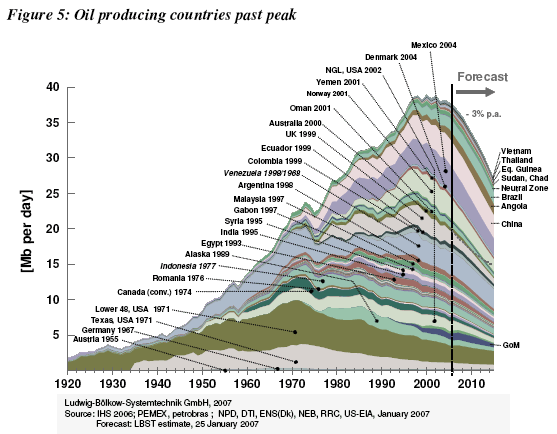Yes, optimally, enough to replace imports for one year.
which is impressive, considering it's only one formation. Besides, I'm not interested in replacing imports; I'm interested in creating American jobs, boosting the American economy, increasing government revenues, and increasing the Oil Supply in such a manner as to reduce OPEC's control over the industry. If we keep buying from Canada (our largest importer), I'm fine with that.
That is a little over two years of oil that we import
i thought 3.5 Billion was how much we import a year?
now, i took the college-math-for-dummies course, but it seems to me that 3.5 + 3.5 < 800. Just sayin....
and it was noted that that depends on economic and technological concerns
which are being solved even as we speak (type).
It further notes that even under "high growth assumptions" an oil shale production level of 1 million barrels per day (about 10% of what the US imports daily) is probably more than 20 years in the future.
that's awesome. a
single source can replace
10% of our imports. I cannot tell you how happy that thought makes me.
gosh, added into drilling off of both coasts, Alaska, and the Gulf... wow, that's alot of oil.
With the increase in world demand in the next 20 years, not only is this not the answer to our domestic peak oil that we passed in 1971, it is likely to not even make a dent in the world oil market in 20 years.
you are right that demand is going up. which makes oil more valuable. explain to me, again, why we don't want to take advantage of a resource that we
have that is
guaranteed to go
up in price?
We are producing more oil than we have in the last decade
thanks to the Bush Administration, yes. and we need to put that on turbo.
How do you force a company to build refineries they don't need. The oil companies have not felt the investment was wise given so little supply of oil in this country.
so little? we have the largest reserves in the
world, man. it's the
regulatory burden that keeps us from building new refinerys - everyone has NIMBY syndrome.
Not possible given that we passed peak oil in this country in 1971. Most other countries have as well. That is why we are approaching world peak oil, and why the price for that imported oil keeps going up.
price jumps with world news and moves generally upward as demand increases. "peak oil" theories have nothing to do with it.
1971 :lol: want me to waste another 3 minutes with Google and demonstrate to you how much reserves have
expanded since 1971?
You can't magically make something appear where it is not. What we need to be doing before oil becomes prohibitively expensive is to develop alternatives unless we want the rest of the world to continue the jump they have on us in this vital area.
1. if the world wants to waste the resources hammering out the bugs before the thing becomes profitable, let them. If Spain wants to destroy chunks of it's economy and hike unemployment in vain pursuit of "green jobs", then that's their call, let them. If they ever manage to come up with something, we can then buy it from them, take the design, reverse engineer it, make it better, and sell it ourselves. The Japanese were working on miniaturizing nuclear before the Fukushima disaster - I hope they either continue to do so, or are far enough along that we can capitalize on their research and design.
2. the rest of the world is exploiting their oil.
because they are smarter than we are. Go tell Brazil or China not to drill - they will laugh in your face and inquire if you have been taking recreational drugs to suggest such a thing.
3. if oil ever becomes prohibitively expensive, then the market will respond to the potential profit by providing alternatives which are cheaper. probably eventually it will whether or not oil changes in price. Perhaps eventually some genius will give us "Back To The Future" engines which run on banana peels and paper wrappers. but right now oil is the linchpin of our economy in a thousand ways, and it's plentiful, and it's still relatively cheap. My point here is that we have the ability to make it
more plentiful and
cheaper, and do so in a way that boosts our economy, our ability to conduct foreign policy,
and government revenues at a time when we desperately need them.
and we are stupid when we do not do so.


